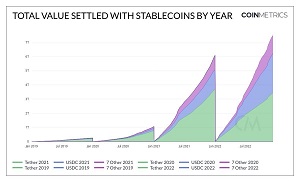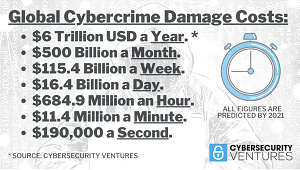News
Davos 2023: Cryptocurrency Rebound Seen, Calls for Global Cybercrime Rules
At least one expert at the upcoming World Economic Forum (WEF) predicts better things ahead for cryptocurrencies after a "terrible year," while others are calling for global rules to crack down on cybercrime.
The WEF event (often just called "Davos" for its hosting Alpine resort in Switzerland), is the place where heavy hitters from business/economics, politics, journalism, entertainment and other worldwide institutions gather to shape global, regional and industry agendas. It is seen by some as the place where global elites gather annually to chart how things will work in the future here on earth.
A Jan. 3 post about the future of cryptocurrencies penned by Dante Disparte, an exec at Circle Internet Financial, notes that 2022 was indeed a very bad year for crypto, seeing the evaporation of more than $2 trillion in the largely speculative market amid several highly publicized, large-scale failures.
However, Disparte likens the 2022 shakeup to the dot-com bubble in the 1990s that eventually burst with the elimination of many companies.
"To the diehard crypto utopians (and some crypto-anarchists), 2022 was not just another 'crypto winter,' but more of an ice age," he said. "Along with a broad loss of confidence, economic value and a market littered with the tombstones of failed firms and projects, perhaps the era of crypto speculation will remain frozen in ice, giving way to a Cambrian explosion for responsible, always-on internet finance.
"Just as it took the dot-com bubble bursting in the early 2000s to hand over the future of the internet to more durable companies, business models and use cases, perhaps 2022 marks a handover of crypto technology and blockchain infrastructure to steadier hands."
 [Click on image for larger view.] To the diehard crypto utopians (and some crypto-anarchists), 2022 was not just another 'crypto winter,' but more of an ice age. (source: Coin Metrics).
[Click on image for larger view.] To the diehard crypto utopians (and some crypto-anarchists), 2022 was not just another 'crypto winter,' but more of an ice age. (source: Coin Metrics).
Along with that possible transition of crypto technology and blockchain infrastructure to more regulated and established institutions, Disparte sees them continuing to be integral parts of the modern economic toolkit. However, that viewpoint might be best ingested with a grain of salt. As Circle is a cryptocurrency company, Disparte obviously has skin in the game, and his company has a full slate of crypto-positive presentations during the Jan. 16-20 conference.
Meanwhile, another Davos 2023 post explains "Why we need global rules to crack down on cybercrime." The reasoning for that contention is presented by two people associated with the Igarapé Institute: co-founder Robert Muggah and associate Mac Margolis, also a Washington Post columnist. The Brazilian-based organization is a think tank focusing on emerging security and development issues.
Again, a bleak picture was painted of the cybercrime techscape, with the post including these observations:
- Deepening geopolitical tensions have increased the prevalence of so-called advanced persistent threats (APTs), which are becoming as sophisticated as they are pervasive.
- New technology is scaling up the reach and impact of cybercrime: malware and ransomware attacks (the latter threaten to publish data or permanently block it unless a ransom is paid) soared by over 350 percent and 430 percent respectively in 2020.
- Next-generation tools are bypassing antivirus programs, which is why living off the land (LOtL) attacks, in which attackers use legitimate software and functions to perpetrate malicious actions, accounted for almost two thirds of all reported incidents in 2021.
- All of the above problems are compounded by a scarcity of security experts, poor reporting habits and a lack of global agreements about how to regulate cyber threats.
"Cybercrime is big business," Muggah and Margolis said. "One industry group estimated that the damages incurred by all forms of cybercrime, including the cost of recovery and remediation, totalled $3 trillion in 2015, $6 trillion in 2021, and could reach $10.5 trillion annually by 2025. But the impact of cybercrime extends far beyond the economic costs. It also degrades trust among internet users, and damages the reputations of public and private service providers. Online attacks ratchet up tensions between nations, since governments and critical infrastructure are increasingly the targets. Yet despite all this, there are still few clear global norms, standards and rules to mitigate and prevent cybercrime."
 [Click on image for larger view.] Global Cybercrime Damage. (source: Cybersecurity Ventures).
[Click on image for larger view.] Global Cybercrime Damage. (source: Cybersecurity Ventures).
They note that cybercrime is difficult to combat because of its distributed nature, which sees perpetrators ranging from powerful intelligence agencies backed by nation-states to teenage hackers.
"Without global cooperation or a major structural change to the internet, there is not much that victims can do to defend themselves," the post said. "Cyber insurance is not only increasingly out of reach to most buyers, but it's potentially making a bad problem even worse. We urgently need international rules that are enforced as well as a more expansive approach that fosters cyber resilience."
For more on the "making a bad problem even worse" idea, see the Virtualization & Cloud Review article, "Should Ransomware Payoffs Be Outlawed?"
And yet, on the positive side of things, the duo point to an improving situation for the reporting of data breaches and cyber threats, something that many organizations have been loathe to do because of reputational damage concerns. Indeed, reputational damage was listed as a primary concern in Virtualization & Cloud Review articles including "Survey Shows Limits of Ransomware Insurance, Payoffs" and "Cybersecurity Incident Responders Help 'Rebuild Trust' After Attack."
"Initiating incident response actions is often just the beginning of a protracted effort to rebuild brand and reputation," analyst firm Forrester said in a report covered in the latter article. "The work of rebuilding trust -- with customers, employees, partners, insurers and regulators -- begins in earnest after an organization recovers operations post-breach."
Breach-reporting laws are in effect in the European Union and the United States. "Until global rules are strengthened and reporting of breaches is mandatory across most sectors, it will be impossible to understand the true magnitude of the challenge, much less develop targeted solutions," the Muggah/Margolis post said.
Furthermore on the positive side, the United Nations is taking some action to alleviate the sorry state of cybercrime.
The post notes that a UN cybercrime treaty saw some initial support in 2019, and nations are currently negotiating a "Comprehensive International Convention on Countering the Use of Information and Communications Technologies for Criminal Purposes" treaty that was reportedly determined by most western governments to uphold individual data protection and privacy rights.
About the Author
David Ramel is an editor and writer at Converge 360.